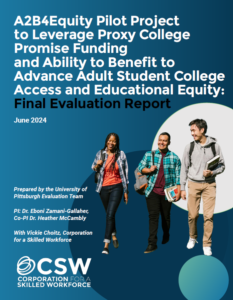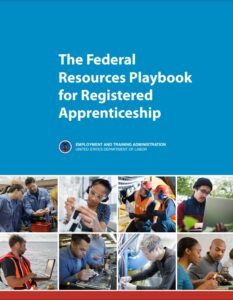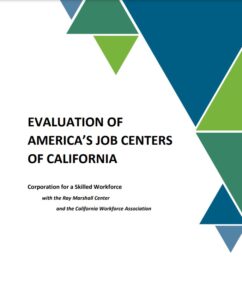CSW’s Federal, State & Local Systems Change team transforms multi-level workforce systems, policy, and practice to reduce poverty, increase economic mobility for low-wage workers, and address racial disparities. We connect the dots among workforce development, education, human services, community economic development, and industry to catalyze change. Many tools and systems focused on increasing economic opportunity were designed for a very different economy and set of challenges than we now face. In response to the current economic environment, our team focuses on multi-stakeholder solutions–rethinking learning, work, supports, and their intersections. This collaborative effort occurs within communities dedicated to these goals, driving complex systems changes for a positive impact.
Who We Work With
CSW works with stakeholders at multiple levels–federal, state, community, industry, agency–to challenge the status quo, strip away outdated assumptions, and co-design systems change solutions that drive equity and economic growth.
How We Do It
- Policy & Strategy Development
- Equitable System Design
- Industry Partnership Expansion
- Workforce Board Support
- Funding & Program Innovation
How We’re Making Change
Policy & Strategy Development
CSW collaborates with policymakers, administrators, and advocates to develop workforce policies that drive inclusive economic growth for all. Our policy design principles involve research, data, and stakeholder input, ensuring the highest alignment between goals and outcomes. We offer guidance and tools to administrators fostering successful implementation, and crafting strategies which encourage widespread adoption.
Equitable System Design
CSW advances racial and economic equity for students and workers through community-centered program design. We develop programs with input from students and workers, as well as service providers. Our team provides operation guidance, tools, capacity building, and staff training, offering the necessary structure for effective long-term change.
Industry Partner Expansion
To advance economic development, CSW forges demand-driven partnerships with employers, industry groups, and workforce programs. Our team engages in communities and regions to identify employer talent needs and strategies for both short- and long-term training and education pipelines. This approach allows us to build intermediary infrastructure at scale, enabling flexibility in response to economic shifts and changing skills needs.
Workforce Board Support
Our team collaborates with workforce board members and leaders, providing strategic and tactical support to advance ambitious agendas. We partner with directors and staff to design policies and programs, establish procurement and funding infrastructure, and enhance capacity of staff, grantees, and partners through training and communities of practice.
Funding & Program Innovation
CSW designs innovative funding tools to expand employment services, improve access and outcomes, and create agile, responsive workforce systems. We work across public systems to identify ways to better integrate resources and enhance flexibility to achieve partner goals. We provide tools, training, and resources to administrators and policymakers that help to increase access to and availability of public and private funding for workforce and education systems.
An overwhelming number of training programs do
not prioritize demand
occupations or quality jobs.
40% of program graduates earned less than $25,000/year, and only 54%
of the programs were training for occupations expected to grow over
the next 10 years.
Featured Case Study: A2B4Equity: Advancing Adults’ Ability to Benefit Through Equitable College Promise Programs
CSW, with support from the ECMC Foundation, partnered with World Education and the University of Pittsburgh School of Education to pilot an initiative to bolster equity in post-secondary education through an innovative funding strategy to accelerate student achievement. In order to access federal student financial aid, students must have a high school diploma. This policy effectively locks out low-income students who may have stopped out of school years ago but are ready and able to earn a postsecondary career and technical education credential now; and blocks them from accessing career-building credentials and good jobs. These policies also leave valuable talent on the table in the middle of a massive labor shortage in this county. The A2B4 Equity project worked with community colleges in Michigan and Chicago to test the use of “college promise” funding to pay for enrollment into career pathway programs for students who do not have a high school diploma or equivalent, leveraging one of the options in the Ability to Benefit provision of the federal Title IV student financial aid program. The goals of this pilot program are to broaden postsecondary participation and completion to a new population of currently unserved adult students; address historic systemic racial and income disparities in high school completion and postsecondary access and success; and increase the strategic use of financial aid resources to benefit students across the country.
A2B4Equity Pilot Project to Leverage Proxy College Promise Funding and Ability to Benefit to Advance Adult Student College Access and Educational Equity: Final Evaluation Report
The Unsung Student Aid Option: A College Leader’s Guide to Implementing the Credit-Hour Ability to Benefit Provision in the Federal Student Aid Program
Recent Clients & Selected Work
- A2B4Equity PilotECMC Foundation
- America’s Jobs Centers of California EvaluationCalifornia Workforce Development Board
- Career Pathways Learning Network United Way of Metropolitan Dallas
- Creating a Regional Business Intermediary for WorkforceRalph C. Wilson Foundation & Ballmer Group
- Optimization of the Utilization of Financial Aid in the Pennsylvania Workforce System Pennsylvania Department of Labor and Industry Bureau of Workforce Development Administration
- Regional Equity and Recovery Partnership Evaluation California Workforce Development Board
- Setting a Regional Strategy for Opportunity Youth Southeast Michigan – Ballmer Group
Featured Reports & Publications
A2B4Equity Final Evaluation Report
CSW & the University of Pittsburgh
The Federal Resources Playbook for Registered Apprenticeship
CSW & US Department of Labor
Recent Posts on Federal, State, & Local Systems Change
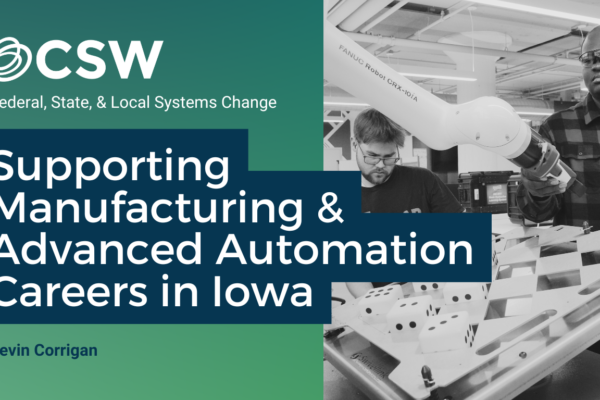
Supporting Manufacturing & Advanced Automation Careers in Iowa
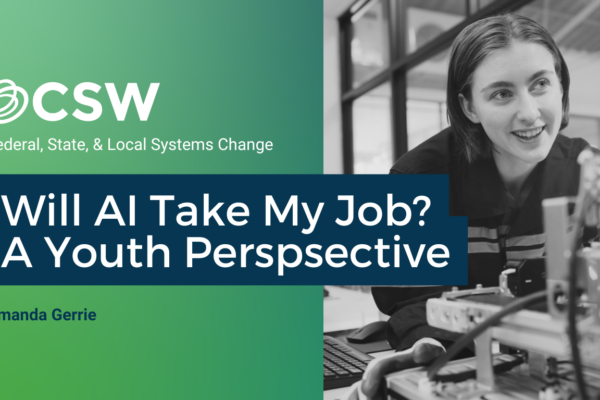
Will AI Take My Job? A Youth Perspective
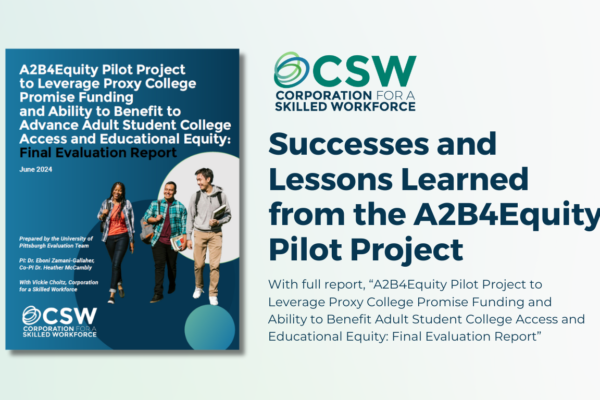
Successes and Lessons Learned from the A2B4Equity Pilot Project
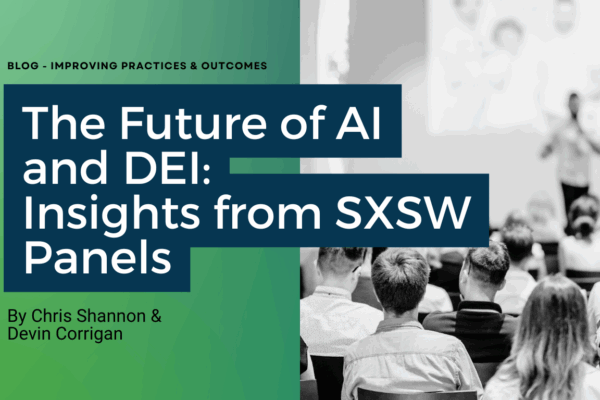
The Future of AI and DEI: Insights from SXSW Panels
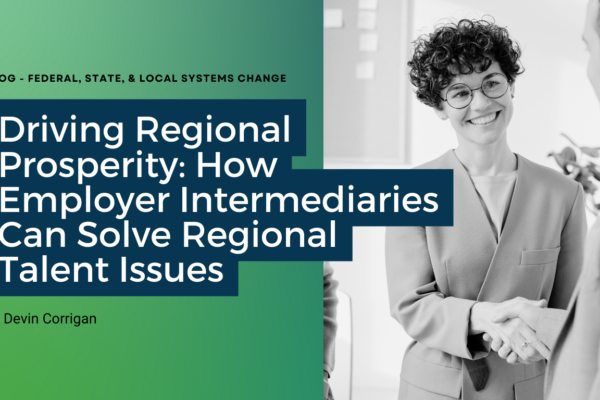
Driving Regional Prosperity: How Employer Intermediaries Can Solve Regional Talent Issues
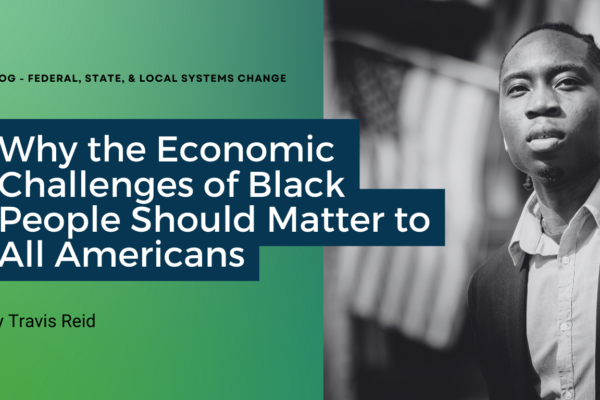
Why the Economic Challenges of Black People Should Matter to All Americans
Meet the Federal, State, & Local Systems Change Team:
Amy Wallace
Director of Federal, State, & Local Systems Change
Devin Corrigan
Senior Policy Associate
Amanda Gerrie
Senior Policy Associate



